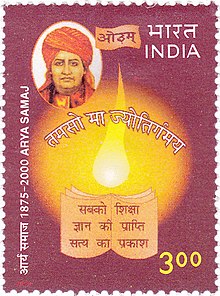Arya Samaj Vidhi
Arya Samaj Vidhi
Arya Samaj ("Noble Society") is a monotheistic Indian Hindu reform movement that promotes values and practices based on the belief in the infallible authority of the Vedas. The samaj was founded by Maharishi Dayanand Saraswati on 10 April 1875. Members of the Arya Samaj believe in one God and reject the worship of idols. Arya Samaj was the first Hindu organization to introduce proselytization in Hinduism.
Antyeshti is final sacrament performed after death, where the physical body is offered back to nature with God’s blessings. The soul leaves the body at the time of death and takes the subtle and causal bodies with it. After death, Atma enters the emptiness of cosmos, and as preordained according to its karma, either takes a new birth or achieves salvation or MOKSHA.
Procedure of Antyeshti Sanskaar
Hindus give ceremonial bath (cleaning) to the dead body, wrap the body in clean cloth or dress, put garlands and sprinkle scents and respectfully take the body to the cremation ground in the company of relatives and friends. Very close and sensitive relatives who cannot stand the sight of confining the body to flames do not accompany the body to the cremation ground. On the way, the accompanying persons chant the slogan: “God is the companion of the departed one. He will take care of the person”.
At the cremation ground, some ceremonies are performed with the help of professional family priests and the body is respectfully placed on the fire place. Fire is ignited among holy chanting and prayers, bowing down before fire. Fire is worshipped as a manifestation of God to whom the body is given as the last offering of the human birth.
Those who have been to the cremation ground are advised to take bath and change their clothes before getting back to normal work. This is a part of hygiene. In the process of touching the dead body or being close to it, the person might be tainted by harmful bacteria, etc. Also, in the cremation ground, we have dead bodies who are afflicted by various types of diseases or the bodies which have undergone decomposition due to delay in cremation. Fire and Water are the cleaning and purifying Agents of Nature.
Ashes (bones) are respectfully collected from the cremation place after 3 days and immersed in holy places at suitable times, with appropriate respect.
There are ceremonies for 12 to 13 days, Garud Puran Path, Sapindi, Pind Dan, Kriya Shiv Puja, Narayan Bali for the peaceful journey of the departed soul and with chanting of God’s Names and singing of holy songs to create an atmosphere of soft and soothing adjustment of family members and friends to the new situation with loss of their close relative/friend.
There are monthly and annual ceremonies with memories of respect, affection and prayers for the welfare of the departed person.
Hindus believe that broadly an individual is composed of:
(a) Soul never gets destroyed: It is immortal. It witnesses birth and death in various bodies.
(b) Subtle Body accompanies the Soul, birth after birth, till subtle body gets completely purified and soul merges into the total Universal Consciousness. This subtle body goes out of the gross body, in company of the soul at the time of “death”. This (soul + subtle body) takes rebirth of a type depending on the actions of the individual. A person with good record of actions in the past takes birth in a beautiful, healthy human body, in the family of pious and prosperous persons. A person with record of evil and cruel actions in the past takes birth in one of 84,00,000 types of bodies, including animals, insects, etc. In each body, the person learns to do good in its own capacity and progresses upward to take birth again in human body, learns lessons of Nature and lives a life of nobleness, to be one with God, the Universal Consciousness.
Hindus avoid converting the whole or major part of our land surface on the earth into a wide graveyard and to dump one dead body over the other at one place. Cremation as the best method of disposal of a dead body, with due respect, honour and affection

